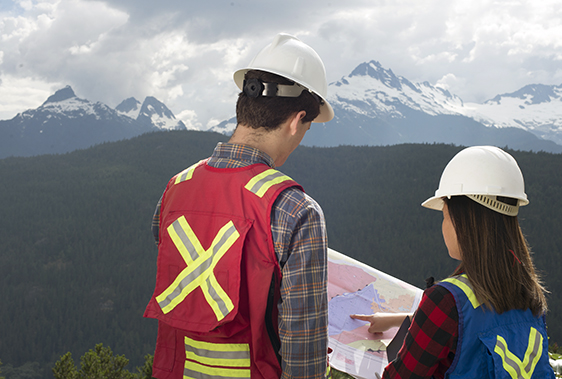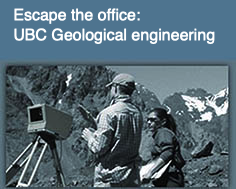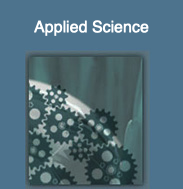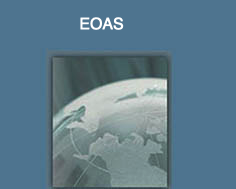GRADUATE STUDIES IN GEOLOGICAL ENGINEERING
 |
| Learn to integrate field observations, experiments, monitoring data, and advanced numerical modelling in the engineering decision making process. |
UBC Geological Engineering offers graduate programs at both the Masters and Doctorate levels. At the Masters level we offer two options, our course-based professional development option (MEng) and our thesis-based research experience option (MASc).
Faculty members in the Geological Engineering program have research interests in the following general areas:
- landslides, debris flows, runout analysis, hazard assessment
- groundwater hydrology, groundwater contamination & remediation, reactive transport modeling, environmental geochemistry
- rock mechanics & rock engineering, open pit & underground mine design, tunnelling
Other research areas include geotechnical engineering, environmental geology, economic geology and applied geophysics. Students are encouraged to consult individual faculty members for information about current research areas.
Graduate Certificate (GCAGE)
Overview:
The Graduate Certificate in Applied Geological Engineering is an 8-month, 9-credit specialized program for engineers and geoscientists on advanced applications of applied geotechnics.
The program will equip geoscientists and engineers from relevant disciplines with the knowledge and skills necessary to tackle advanced challenges faced in the geological engineering discipline. This includes opportunities for learners to develop key skills necessary for advancing in geological engineering practice: collaborative and critical thinking skills concerning advanced geological engineering challenges, and communication around geological uncertainty and risk.
Please visit the program website for more information.
Master’s (M.A.Sc, M.Eng)
Overview:
UBC Geological Engineering offers graduate programs at both the Masters and Doctorate levels. At the Masters level we offer two options, our course-based professional development option (MEng) and our thesis-based research experience option (MASc). Please
Faculty members in the Geological Engineering program have research interests in the following general areas:
- landslides, debris flows, runout analysis, hazard assessment
- groundwater hydrology, groundwater contamination & remediation, reactive transport modeling, environmental geochemistry
- rock mechanics & rock engineering, open pit & underground mine design, tunnelling
Other research areas include geotechnical engineering, environmental geology, economic geology and applied geophysics. Students are encouraged to consult individual faculty members for information about current research areas.
Please visit the UBC Academic Calendar for more information.
What Makes the Program Unique
Geological Engineering is an interdisciplinary field, in which principles of geoscience are used to solve engineering and environmental problems. It connects geology, physics and chemistry with civil engineering and other fields (e.g. mining, geography, forestry) to provide a versatile set of skills applicable to a wide range of contemporary problems. The qualifications of a geological engineer are similar to those of a civil engineer with geotechnical or environmental specialization; however, our graduates have the advantage of better understanding of geological processes.
Emphasis in our graduate courses is placed on case histories and project work that target the integration of field techniques/data with advanced numerical modelling to better understand the importance of underlying processes, mechanisms, and interactions that can affect engineering designs.
Minimum Admission Requirements
Canadian or American Institution Bachelor's Degree
Applicants that hold an academically equivalent bachelor's degree from a Canadian or American institution to a four-year bachelor's degree from UBC in engineering or a related discipline must have one of the following:
- A minimum overall average in the B+ range (76% at UBC) in third- and fourth-year level courses.
- Academic standing with at least 12 credits of third- or fourth-year level courses in the A grade range (85% or higher at UBC) in the field of study.
- Alternatively, applicants who do not meet the requirements stated above, but who have had significant formal training and relevant professional experience, and/or otherwise possess demonstrable knowledge or expertise that would prepare them adequately for successful study in a specific graduate program, may be granted admission on the recommendation of the appropriate graduate program and approval of the administering Faculty.
International Institution Bachelor's Degree
Applicants must hold a credential deemed academically equivalent to a four-year bachelor's degree from UBC in engineering or a related discipline. View the specific minimum admission requirements established by the University for graduates of different countries. These are the minimum requirements for admission to the University. Individual graduate programs may have additional admission requirements.
How to Apply:
Please visit Prospective Students
PhD
Overview:
Our program delivers an interdisciplinary experience, combining principles of geotechnical engineering, hydrogeology and geology, to provide a versatile set of skills needed to solve a wide range of practical problems related to engineering interactions with the earth environment.
Faculty members in the Geological Engineering program have research interests in the following general areas:
- landslides, debris flows, runout analysis, hazard assessment
- groundwater hydrology, groundwater contamination & remediation, reactive transport modeling, environmental geochemistry
- rock mechanics & rock engineering, open pit & underground mine design, tunnelling
Other research areas include geotechnical engineering, environmental geology, economic geology and applied geophysics. Students are encouraged to consult individual faculty members for information about current research areas.
Please visit the UBC Academic Calendar for more information.
What Makes the Program Unique
Geological Engineering is an interdisciplinary field, in which principles of geoscience are used to solve engineering and environmental problems. It connects geology, physics and chemistry with civil engineering and other fields (e.g. mining, geography, forestry) to provide a versatile set of skills applicable to a wide range of contemporary problems. The qualifications of a geological engineer are similar to those of a civil engineer with geotechnical or environmental specialization; however, our graduates have the advantage of better understanding of geological processes.
How to Apply:
Please visit Prospective Students



